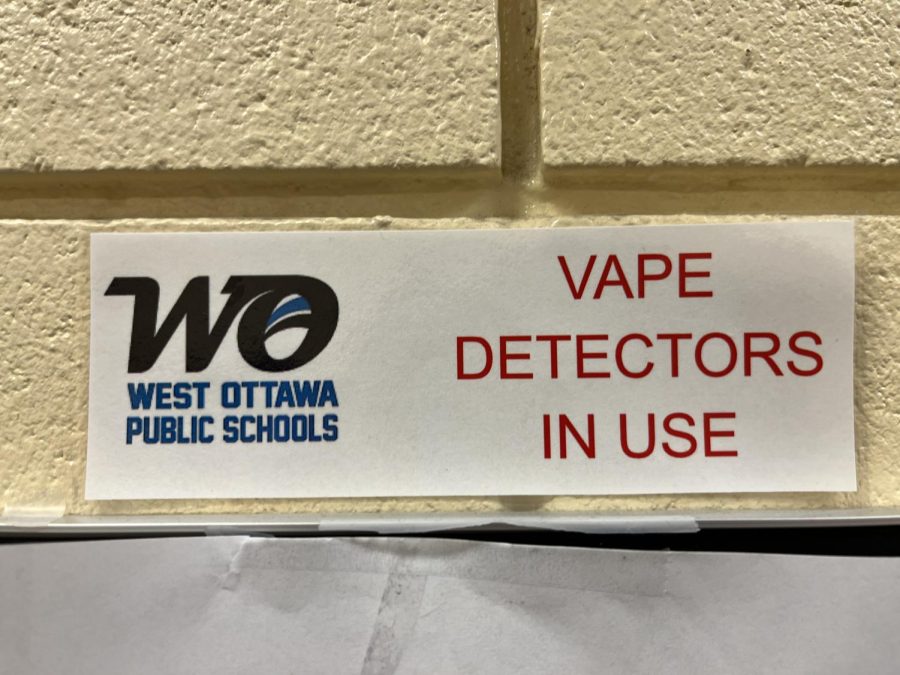Vape sensors installed in WO bathrooms
Small signs which have been posted outside of every bathroom at WO.
October 27, 2022
Soph. Gionna Bean washes her hands in the second floor bathroom on the west end of West Ottawa High School’s South building. As she’s drying off, a skunky smell fills her nose and footsteps approach. She frantically scans the room; she didn’t do anything wrong, but she stays in place anyways. She knows exactly why Assistant Principal Lindsay Cherry is coming to evacuate the bathroom: somebody set off the vape sensor.
If the all caps messages outside every bathroom did not do the trick, WOHS Principal Kristine Jernigan would like to make an announcement: vape sensors are here.
“This isn’t a secret, this is something that we’re doing, and it’s fair for our kids to know about it,”Jernigan said.
Schools around the country have been struggling with increasing vape usage for years, and WO is no exception. Campus safety Ashley Kliphuis said, “It was becoming an issue in almost every bathroom, it’s a daily battle.”
But it is not just about students wasting time in the bathroom–it is about students making an incredibly dangerous decision for their health. Kliphuis said, “It’s not good for your brain, it’s not good for your lungs, the nicotine and additives in the [vapes] you all seem to enjoy is very addicting and nicotine is such an addictive chemical on its own… the weed is just hindering the development of your brain. Boys’ brains don’t even fully develop until about 28, and girls around 25, like, you’ve got a long way to go. And I just wish you guys would make better choices for your health and safety.”
“That’s why we put in the vape sensors, because we have to pick and choose our battles sometimes, and this is a battle that we have to fight because we care about kids and we have to keep them safe. Sometimes that means keeping them safe from themselves,” Jernigan said.
The decision to advertise the installment of the sensors outside the bathrooms rather than hiding their existence was deliberate. It speaks to Jernigan’s goal with the new technology- “We’re not trying to catch kids, we’re trying to help them. If we can minimize this a little bit, if we can keep kids from bringing these into the school, we’ll feel good. I’d like to see all you guys grow up to be healthy and successful… and the fact that this could really impact your health is scary to me.”
And if you are a student concerned about being stuck in the bathroom when someone else is vaping, Bean would encourage you not to worry. For her, the process was quick and painless. “We had to write down a statement of what we’d seen, what we’d smelled you know, in the bathroom, and then I was allowed to go back to class… I thought it would be longer and she’d talk to us about it longer, but it was actually pretty quick,” Bean said.
To summarize, vaping (or using any kind of illegal drugs, for that matter) is terrible for developing high schoolers’ brains. With these new sensors, the school hopes to deter this kind of behavior both inside and outside of school.
Jernigan and Kliphuis have the same message to WO students: “Don’t vape.”





